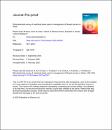Ethnobotanical survey of medicinal plants used in management of breast cancers in Qatar

View/
Publisher version (Check access options)
Check access options
Date
2025-02-28Author
Rasha.S.Abo, El AlaaAl-Jaber, Hend
Chokor, Fatima Al Zahraa
Shaito, Abdullah A.
Al-Mansoori, Layla
Metadata
Show full item recordAbstract
Breast cancer is a global health concern, including in Qatar, where it impacts women significantly. The complexity of breast cancer requires diverse treatment approaches influenced by tumor characteristics and biology. Despite advancements, current treatments still fall short of providing definitive solutions, particularly for triple-negative breast cancer. Complementary and Alternative Medicine (CAM), including herbal remedies, is increasingly popular among cancer patients, including those in Qatar. In Qatar, herbal medicine is widely used by the population, including breast cancer patients, yet preserving this knowledge faces significant challenges. This study aimed to document herbalists' ethnobotanical practices concerning breast cancer treatment in Qatar and corroborate any identified plant remedies' anticancer use with the literature. Thirteen herbalists were identified in Doha, Qatar, and surveyed using an ethnobotanical questionnaire between October and November 2022. Herbalists’ demographic data and their herbal recommendations for breast cancer treatment were collected through structured interviews. Descriptive statistics and the Relative Frequency Citation (RFC) were employed for data analysis. The current study aimed to document herbalists' practices for breast cancer management in Qatar and validate the anticancer potential of the identified plants through existing literature. The present study documented the ethnobotanical knowledge of 13 herbalists in Qatar regarding breast cancer treatment, revealing the use of various plant species from ten different families. Saussurea costus (Falc.) Lipsch. (Al Qist Al Hindi), Zingiber officinale Roscoe (Ginger) (zanjabel) and Nigella sativa L. (Black seeds) (habit elbaraka) were the most recommended plants.Literature searches revealed that many of these plants possess compounds with potential anticancer properties as sesquiterpenes, flavonoids, thymoquinone, volatile terpenic compounds and anthocyanin. The sources of these plants were primarily India and Iran due to their historical trade relations with Qatar. Herbalists predominantly use plant underground parts but could consider integrating leaves with proven anticancer properties. Each reported plant was scrutinized for its anticancer potential, by collecting the published research about its anticancer uses, revealing significant cytotoxicity against breast cancer cells. The literature survey also uncovered that most plants are reported to induce apoptosis through specific pathways, while others showed chemo-sensitization effects and cancer-induced mutation prevention. Moreover, some of the recommended plants have advanced to clinical studies. Beyond cancer, these plants displayed promise in addressing diabetes and inflammation. In conclusion, our study on herbalists' recommendations for breast cancer documents the traditional practices for patient therapy in Qatar. Saussurea costus (Falc.) Lipsch. (Al Qist Al Hindi) emerged as a commonly prescribed plant, with the roots being predominantly used. Overall, our findings describe the current traditional practices for handling breast cancer in Qatar and offer insights into integrating traditional practices with modern medicine for enhanced breast cancer management.
Collections
- Biomedical Research Center Research [840 items ]
- Biomedical Sciences [851 items ]


